Ulster GAA: Belfast's hijab-wearing Gaelic player
"You cannot say that Gaelic football is just a game - it's part of my life."
While that may be a common sentiment across the island of Ireland, it would be considered more unusual coming from a Muslim woman from Iran.
Mansoreh Abolhassani moved to Northern Ireland from London in 2011 when her youngest son began studying at Queen's University, Belfast.
Later, Mansoreh decided that she would study law at Queen's.
In 2015, she received an email about the university's international ladies Gaelic football team.
"I was so curious - it's football, I know football, but what about Gaelic football?
"It's a local game and maybe it's interesting, because it's local and I really love to know about culture and people around the world," she said.
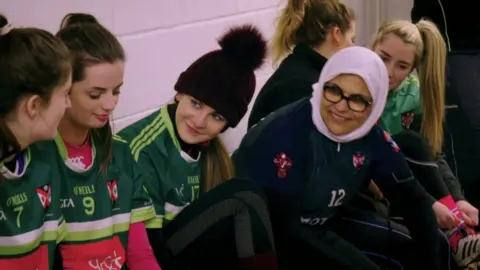
"I told myself 'let's go and see, maybe it's interesting just watching the game and you can realise the meaning of Gaelic football'.
"It was amazing, because there were girls from around the world - from Canada, from America, from Malaysia, China - and it was the diversity of people and I really wanted to meet those people.
"The first lesson that I learned from Gaelic football is that this game pushes you to meet many nice and many different faces and it was so nice for me, because I really wanted to know about different people and other cultures around the world."
'Welcomed'
Mansoreh's story is featured in a new two-part series for BBC Two Northern Ireland, Níos Mó Ná Cluiche (More Than a Game).
Jarlath Burns, former Armagh captain and GAA commentator, explores the history of Gaelic games in Ulster and the grassroots commitment in clubs and counties.
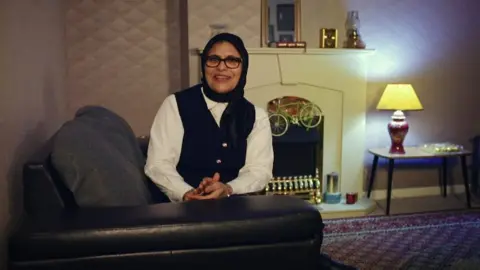
Mansoreh had played volleyball in her younger days, and while she initially found aspects of Gaelic football baffling, she also saw some similarities to other sports.
"It was so strange for me, because I saw that sometimes the ball is in their hands and sometimes it touches their fists," she said.
"I told myself it's such an interesting game, because it's not just football, it's like basketball as well, it's got the technique of even tennis, it's mixing volleyball as well - mixing all of the sports together.
"Gaelic football was a trigger for me to understand this island and people from Northern Ireland and the south of Ireland. It means so much to me."
As well as allowing her to meet many new friends, the game has taken Mansoreh to places like Shanghai for an international tournament.
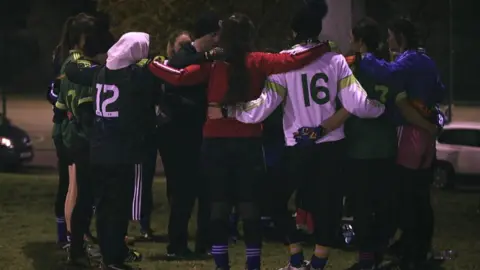
She says even as a busy single mother in her 40s - her husband is currently living in Iran - she still makes time to play the game.
However, as she is soon due to graduate, she won't be eligible to play for the university's international team next year.
"My plan is maybe to go to my nearest club," she said.
Her love for the game has even seen her email authorities in her native Iran to ask them if she could introduce the sport to the country.
She has yet to receive a reply.
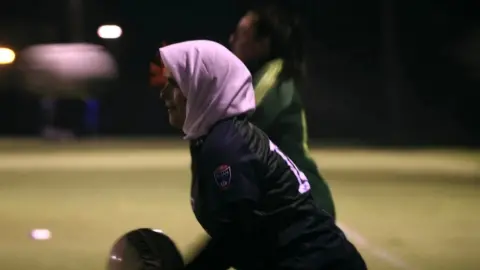
While Mansoreh says she is not an overly religious person, she said the hijab or head scarf is part of her identity as a Muslim and she was initially nervous that she would not be allowed to wear hers while playing Gaelic.
"To be honest I was really, really scared from the beginning, even watching and playing Gaelic football, that maybe they would say 'with your scarf, it's not possible'," she said.
"They gave me lots of confidence, because they welcomed me, they didn't look at my scarf as unusual and didn't ask me to remove it or why I was wearing it.
"If they didn't accept me with my scarf, definitely it would have stopped me playing, but it was amazing for me.
"It's a nice message to other women around the world that your hijab, your identification, will not limit you in anything that you want to do.
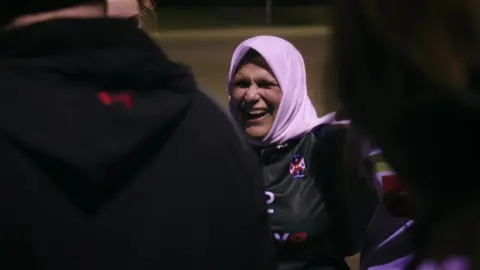
"Now, when I meet my Muslim friends I encourage them to play, to cycle, to do whatever you want."
- The first part of the programme will be broadcast on BBC2 NI on Sunday 11 June, at 22:30 BST, with the second shown a week later.
